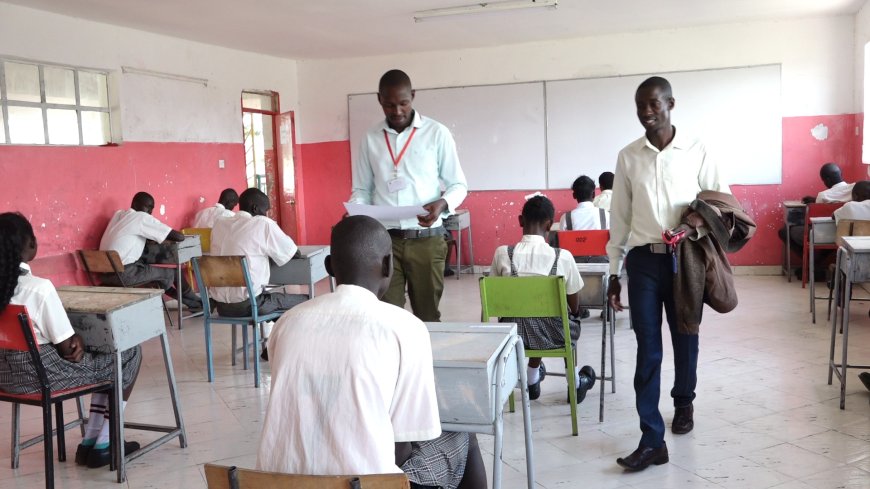End of an era as last KCPE class sits exams

Nakuru,
Saturday, October 28, 2023
KNA by Anne Mwale
When 1.4 million Kenya Certificate of Primary Education (KCPE) candidates write their mathematics, English language and English composition examinations on Monday, it will be the beginning of an end of KCPE’s 38-year-old era.
Amidst great fanfare and ceremony, the 8-4-4 system of education was launched in 1985. It was hailed for its model that promoted practical learning in lessons like Home Science and Wood Work, Metal Work, Agriculture, Art and Craft.
At least 360,000 candidates sat the KCPE examination for the first time in 1985, ushering in the 8-4-4 system.
For close to four decades, schools and learners scrambled for top positions, and the announcement of KCPE examination results evoked excitement and disappointment, the education system was sometimes maligned and blamed for churning out half-baked graduates.
Roots Academy head teacher Mr Collins Odhiambo believes that as Kenya moves towards Competency Based Curriculum (CBC), the country will produce job creators, and not job seekers.
Roots Academy will present 250 learners for KCPE exams and another 228 for (Kenya Primary School Education Assessment) KPSEA, according to Mr Odhiambo.
Mr Odhiambo reminisces that schools and learners tussled for top positions, and the announcement of KCPE examination results evoked anticipation and occasionally discontent, adding that teachers who taught subjects or headed schools where students repeatedly registered good results were either promoted or rewarded.
While those teachers whose subjects or schools got poor results were allegedly demoted or were reproached.
“Due to the competitive nature of the grading system, we witnessed instances where irate guardians would ‘kick out of office’ a head teacher whenever a school registered poor results, demanding his or her immediate transfer,” noted the head teacher.
Mr Odhiambo, who spoke during the examinations’ rehearsals informed the KCPE candidates, “You will go down in history as our last offsprings in the 8-4-4 curriculum but always remember the system also moulded the careers of your parents and your teachers."
According to Basic Education Principal Secretary Belio Kipsang, about 1.4 million learners registered for this year’s KCPE, the highest number in the history of the exam.
Another 1.2 million Grade Six learners are expected to sit KPSEA.
Prior to 8-4-4, there was the 7-4-2-3 curriculum consisting of seven years of primary education, four years of secondary education, two years of high school, and 3–5 years of university education.
The Kenya Institute of Curriculum Development (KICD) has acknowledged that based on previous studies, 8-4-4 has been widely criticised for failing to recognise and nurture the talents and interests of learners early enough.
The Summative Evaluation of the Curriculum (KIE, 2009) indicated that the 8-4-4-curriculum content and its implementation was academic and examination oriented.
Roots Academy Deputy Headteacher Mr Cleophas Mutai acknowledged that the 8-4-4 curriculum made little provision for the recognition of the learners’ potential, gifts and talents due to too much focus on examination.
He was emphatic that the CBC education system guarantees elimination of individualised national examinations and introduces Continuous Assessment Tests (CATs).
All children will transit to next class and career paths – arts and sports, social science and STEM – created at secondary level.
“8-4-4 curriculum made little provision for the recognition of the learners’ potential, gifts and talents due to too much focus on examination. This contributed to increased dropouts and high unemployment. However, as focus shifts to the new system, the 2–6-3-3 system will eliminate individualised national examinations and introduce Continuous Assessment Tests (CATs),” stated Mr Mutai.
He expressed optimism that there will also be no wastage as all children will transit to the next class and career paths – arts and sports, social sciences and STEM – created at secondary level.
The Deputy head teacher recalled that the KCPE examination was a grave affair as it determined one’s destiny and most people believed that joining a good secondary school was a gateway to a glamorous life.
Mr Mutai however cautioned that the recriminations witnessed over the 8-4-4 system should not be allowed to repeat themselves in the CBC curriculum.
“Hopefully, the CBC system will churn out all-rounded students, critical thinkers who will become enablers of the Vision 2030 blueprint. The new system, however, will be as good as the content that will be inculcated into the learners. Otherwise, it will simply be a case of pouring new wine into old wine-skins,” added the Deputy Head teacher.
However, 14-year-old Neema Wanjiru who is a KCPE candidate at Roots Academy maintained that the 8-4-4 system was the best thing that ever happened.
“Am determined to sign off KCPE in style, a bright future beckons for those who will pass this last KCPE examinations with flying colours,” Wanjiru says
Wanjiru said that she was determined to post good marks and join a good secondary school with her sights trained on securing a slot in the university in the future.
Candidates sitting for KPSEA will only be rated for 40 percent of the final score with the remaining 60 percent derived from classroom-based continuous assessment tests conducted over the last three years in Grades 4,5 and 6.
The competency-based curriculum (CBC) structure adopts the 2-6-6-3 approach where students will spend 2 years in pre-primary, 6 years in Primary, and 6 years in Secondary school (junior and senior) with those proceeding to university spending 3 years at institutions of higher learning.
The curriculum focuses on identifying the potential of every learner and nurturing the potential through various pathways as the student goes through various stages of their education.
The curriculum was implemented in Kenya in December 2017 with the government subsequently establishing a taskforce to collect public views on the implementation of the Competency-based Curriculum and make recommendations later in 2022.
Among the recommendations of the task force included having Junior Secondary Schools domiciled in the current primary schools.
Courtesy; KNA
What's Your Reaction?
































































































































































































































































































